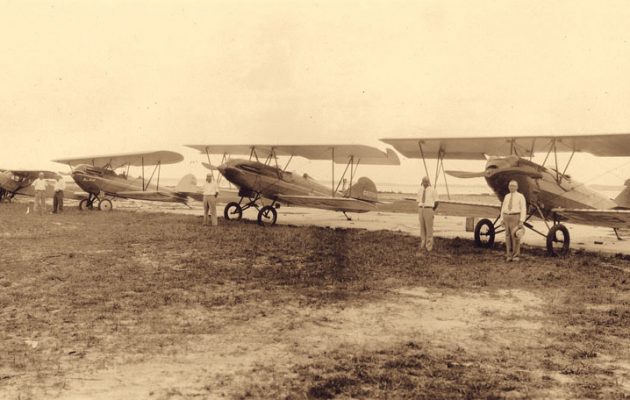World War I serviceman rubs elbows with aviation pioneers

Airplanes first caught Bernard “Toby” Overby’s eye during World War I and when he came back to the States he decided he was going to learn to fly one.
He already knew how to drive a car. He told his son, Robert, that as a teenager he worked in the afternoons parking cars in Richmond, Virginia. After the war that skill came in handy.
He decided to strike out on his own and took the Florida East Coast train south. His son isn’t sure why he stopped in Jacksonville, but recalled his dad was advised when he got to Jacksonville he should talk to the cab drivers at the station about where he might find work.
“He had a job in 30 minutes,” said Robert Overby, who owns Overby’s Auto Repair.
And when he had the chance, Toby Overby learned to fly. His license was signed by aviation pioneer Orville Wright, and he joined a small club of seven Jacksonville pilots led by Laurie Yonge, the first licensed pilot in Florida.
Yonge was responsible for Charles Lindbergh’s only visit to Jacksonville. After Lindbergh made his historic trans-Atlantic flight in the “Spirit of St. Louis,” he returned to the U.S. by ship. Yonge painted “The Spirit of Jacksonville” on his plane, flew out to the ship and dropped a capsule containing an invitation for Lindbergh.
Local aviation pioneer
Toby Overby gave flying lessons and took people sightseeing by air, his son said.
In the early days, everyone flew biplanes, which only needed a few hundred feet to land. Jacksonville had any number of open fields, not to mention the beach. One of the earliest airfields was Paxon Field on the Westside, which opened in 1923. A few years later a field on North Main Street near the City Prison Farm opened as the Municipal Airport, remembered today as Imeson Airport.
And South Jacksonville had an airfield, too, next to the ostrich racing track on what is today the Southbank. There’s an old photograph showing Toby Overby and other pilots standing next to their biplanes at the riverfront field. The Park Lane condos in Riverside are visible in the background.
Some of the pilots were daredevils, known for their acrobatics. Others barnstormed across the country, stopping to buy gas from unsuspecting farmers. Robert Overby said his dad kept his flying local, taking excursions to St. Augustine, Daytona Beach or Lake City.
The local pilots would fly support for the celebrity pilots who came to the airshows. Robert Overby said his father talked about meeting the famous black aviatrix Bessie Coleman, who died in Jacksonville in 1926 while rehearsing for an airshow.
Robert Overby said his dad quit flying during World War II. Toby Overby, born in 1892, offered his services to the military as a flying instructor but was told he was too old, his son said.
“He was done flying when I was born,” Robert Overby said. “I don’t know why he quit. But I think being told he couldn’t help in World War II put a bad taste in his mouth.”
From biplanes to bootleg
But Toby Overby had other adventures, his son said.
In the 1920s, during Prohibition, his father was in the whiskey business.
“Boats from Cuba would come up the coast and locals would go out and buy their goods,” Robert Overby said. “The trick was to know the day and the time.”
And when Prohibition was lifted, Toby Overby opened the first bar at Bay and Clay streets across the street from the Federal Building, his son said.
Later in the 1930s, he went to work as a salesman for a distillery, though his son isn’t sure of the brand.
“He would go into a bar, buy a round of drinks of his brand, socialize with them and convince them to drink his brand,” Robert Overby said.
Later, he worked for Florida Beverage Company. “He was a well-liked, nice guy, could talk to anyone,” his son said.
Robert Overby said his parents also traveled around the Southeast selling an invention — meat slicers. “They loaded up the back of the car and drove around to little towns visiting grocery stores and showing how to slice their hams,” he said.
Toby Overby worked until he was 78 and died in 1979 at the age of 87.
By Lilla Ross
Resident Community News






